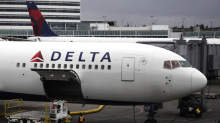Delta in the refinery business: A flight of fancy
 Pricey fuel is the nemesis of Delta Air Lines Inc. and its ilk. But buying Conoco Phillips’ idled plant would increase Delta’s risk. It wouldn’t hedge volatile crude prices and would leave the company exposed to the financial challenges of running a refinery. There are better ways to cut its costs.
Pricey fuel is the nemesis of Delta Air Lines Inc. and its ilk. But buying Conoco Phillips’ idled plant would increase Delta’s risk. It wouldn’t hedge volatile crude prices and would leave the company exposed to the financial challenges of running a refinery. There are better ways to cut its costs.The company certainly should be looking for ways to reduce its fuel bill. Gas guzzlers don’t come much bigger than Delta. With a $12-billion energy bill in 2011, the airline is the world’s largest commercial buyer of jet fuel. So last year’s 31-per-cent price rise stung.
The tendency of airline shares to move in the opposite direction to oil is a long-standing frustration. The past two years have been no exception, with Delta’s stock sinking 30 per cent as the price of Brent crude climbed 50 per cent.
Diving into refining, however, is not the right solution. There may well be merits to taking greater control of the supply chain – known as vertical integration – but if that’s the strategy Delta wants to pursue, buying oil wells would be a better option. Oil refineries, like airlines, are vulnerable to higher crude prices; owning one would only increase the need to offset that risk, rather than providing a hedge.
All Delta would save is the price refiners currently charge to turn the raw crude into jet fuel – the so-called crack spread. That gross margin currently stands at around 6 per cent of the all-in price airlines pay. That might sound attractive by itself, but refining is a tough business even with that fee. Production costs have been high and demand for gasoline ebbing, especially on the East Coast, which is why several refineries there – including Conoco’s – have been shutting up shop.
Delta is no novice in energy markets – it runs a highly sophisticated trading desk. But squeezing engineering efficiencies out of a refinery is a very different business – and if an experienced operator like Conoco cannot make it profitable, it’s hard to see how Delta could.
The airline would be well advised to stick to cutting its fuel bills the old-fashioned way – not least by accelerating the replacement of its less efficient older planes. Flying into one of the few industries that’s as turbulent as airlines will probably only guarantee a rough ride.
You can return to the main Market News page, or press the Back button on your browser.

